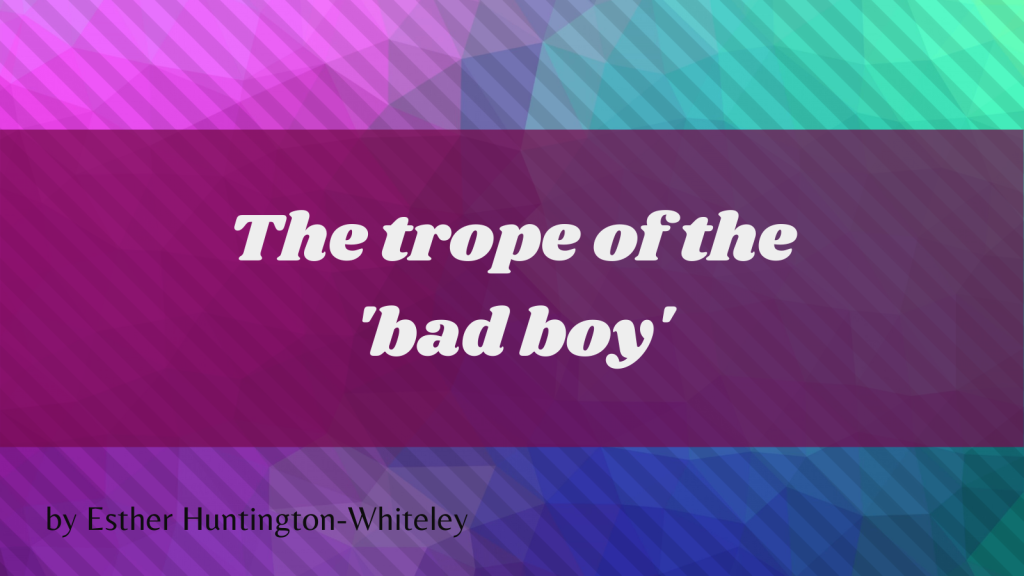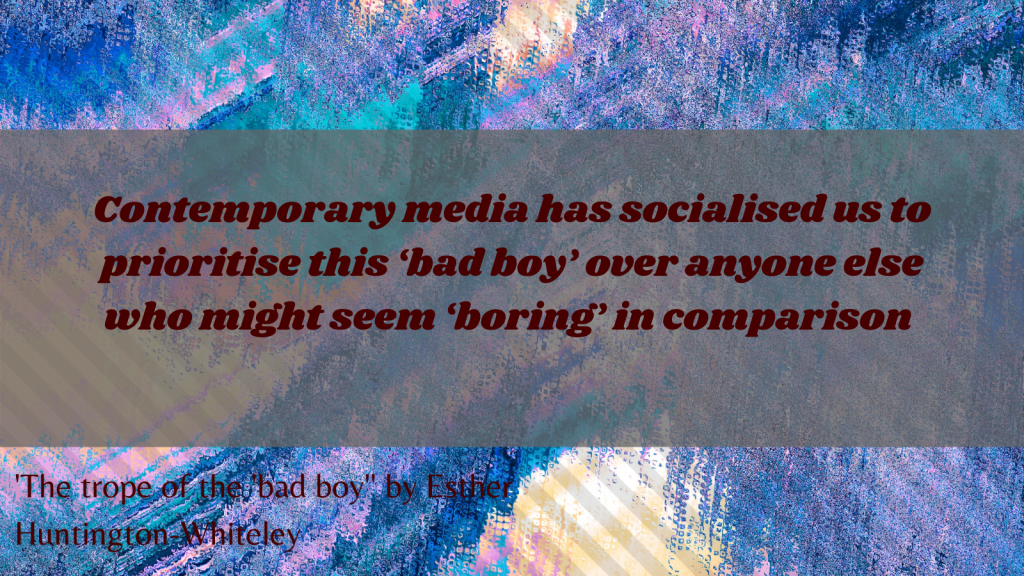
One of contemporary popular culture’s favourite media tropes is the attractive and mysterious ‘bad boy’. We have been taught to romanticise this character on the basis that we might be able to turn around his challenging and borderline unacceptable behaviour. But what happens when our favourite ‘bad boy’ is clearly abusive, exploitative and a danger to the object of his affection?
The blueprint of this character might be Chuck Bass in Gossip Girl, whose toxic on-off relationship with Blair Waldorf captured so many hearts in the late 2000s and beyond. The fact that, in the very first episode of the show, Chuck attempts to rape both his ‘friend’ Serena van der Woodsen and 14-year-old Jenny Humphrey apparently wasn’t enough to put viewers off his heartbreaking charm. When he consensually takes Blair’s virginity seven episodes later (after she has just broken up with his best friend, no less) we are supposed to accept that he is a changed man and not only deserves our forgiveness but also our desire.
Using attempted assault as a character arc is problematic enough without the extra framing that presents him as the show’s central heartthrob. This predicament is further complicated by the fact that real life Ed Westwick, who portrays Chuck on the show, was accused of rape by two women and sexual assault by a third back in 2017. Although the charges were subsequently dropped, this was due to insufficient evidence, rather than the fact that the allegations had been proven to be false. Westwick maintains his innocence, but regardless of this the sinister parallel between the show and real life cannot be overlooked. There is no doubt that Gossip Girl contributed to the normalisation of rape culture which has led many of his fans to continue romanticising both Chuck’s character and the actor who portrays him.
Penn Badgley, also of Gossip Girl fame, stars in the Netflix television series You, a psychological thriller following serial killer Joe Goldberg as he navigates his extreme and delusional obsessions. Somehow, he too became a character for fans to swoon over. Arguably, the point of his character is that we do find him attractive, initially. But once we learn of his horrific behaviour we are supposed to see past the charm and good looks to something much darker underneath. Unsurprisingly, given that the show appeared to do everything in its power to make him as attractive as possible to a mainstream audience, some fans took their adoration too far.

Again, as is the case with Chuck Bass’s character, promoting the ideal of these fictional characters is not just wrong – it’s dangerous. Because it means that when we encounter these people in our real lives – whether it’s an obsessive ex-boyfriend who won’t leave you alone, or a recently matched online dating profile who likes your old Instagram photos at 4am, or even just a man you meet in a bar who relentlessly insists on buying you a drink – suddenly it isn’t creepy anymore, it’s romantic. Contemporary media has socialised us to prioritise this ‘bad boy’ over anyone else who might seem ‘boring’ in comparison.
After’s Hardin Scott, played by Hero Fiennes Tiffin, is another perfect example of a character who is (albeit less creepy than Joe Goldberg) actually not that great of a guy, but still hailed as dream boyfriend material. Not only is he extremely toxic, but his treatment of girlfriend Tessa (Josephine Langford) leaves a lot to be desired. Yet the depiction of their relationship has left a lot of people desiring both him, and the relationship he has cultivated. After was originally published as a Harry Styles fanfiction online by Anna Todd which then became a literary sensation, so it inevitably cultivated a loyal following from fans. While many have criticised both the premise and quality of the books and films, the general consensus among young people in particular is that this is a harmless depiction of a tumultuous relationship. Perhaps for some it might be, but when there is a younger audience demographic, there is also a responsibility to ensure abusive relationships are not becoming normalised in our media.

Ultimately, there is nothing wrong with a character who has problems. However, the problem arises when this character is placed at the centre of a drama or romantic-comedy which is supposedly reflecting the reality of love and relationships. While it may be fictional – and this is something understood by the audience – fictionalising a toxic relationship doesn’t make it any less toxic. We must learn to expect better – from our TV shows, films, and men. Otherwise, we risk perpetuating a culture of abuse where the lines between fiction and reality become blurred.
